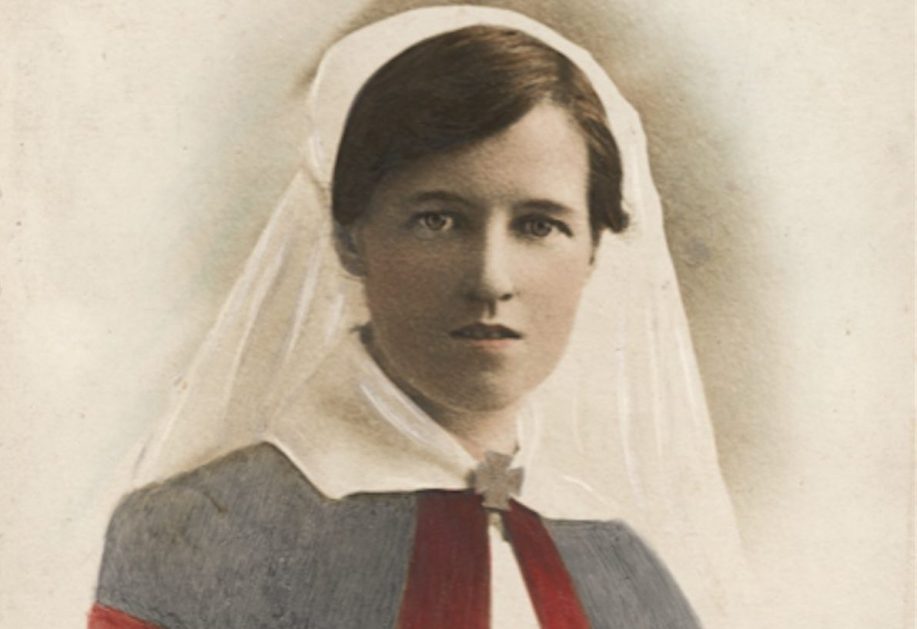
WORLD War I nurse Edith Blake was no Victoria Cross winner. Her name doesn’t appear on the War Memorial’s Roll of Honour. In fact, most people wouldn’t even know her name.
But her story is no less incredible.
In 1918, aged just 32, Edith is believed to be the only Australian nurse killed in action during the Great War, drowned after the British medical ship she served on was struck by a torpedo fired from a German submarine in breach of wartime rules.

Almost a century later, Krista Vane-Tempest, an avid historian and writer, and the grand-niece of Edith, would discover 138 letters written by the heroic nurse during her service.
Compiling the more than 100,000 words written by her great aunt, Krista has written a book that brings Edith’s inspiring story to life.
In “Edith Blake’s War” readers come to intimately know Edith, or as Krista affectionately refers to her, “Edie”, through excerpts of her letters that span from her training as a nurse right up until the month she died.
In 1885, Edie was born into an average family living in the Sydney suburb of Marrickville. Her father, Charles, worked hard as a businessman selling goods to improve the lives of his wife, Catherine, and his three daughters, of whom Edie was the eldest.
“The book is a story of the little people, the leaves in the river like Edie, who were blown along by the currents, the decisions of others,” says Krista.
“It’s important to know those stories because for many people that’s probably what their relatives did. Those stories of the people who were pushed around and sent places and who felt afraid but who tried to keep that stiff upper lip.
“It’s those normal people who did their duty every day that give people a clearer window of the past to look through.”

Before writing “Edith Blake’s War”, Krista only knew faint details of the service her great aunt enlisted for not long after Britain declared war on Germany in August of 1914.
That was until 2011 when, while looking into family history, Krista’s father retrieved a plastic bag that had been stuffed away in the bottom of a wardrobe.
Inside were 138 letters written by Edie spanning an incredible range of moments in her life. In some, she tells her family about her training as a nurse at the public Coast Hospital in Sydney, where she worked gruelling 12 hour days treating some of the city’s poorest and most vulnerable patients.
“You won’t mind getting up in the morning, to see how a very bad case was progressing and you begin to realise, that perhaps the little bit you do for that patient, you may be helping him to get better..
Later, her letters go on to describe the horrors of the operating table during her war years. They detail her experiences nursing wounded soldiers from Gallipoli while serving in Cairo.
Edie would even look after German prisoners of war, with her letters revealing a deep conflict as she found herself feeling sympathy for the enemy soldiers:
“I do not like them. But somehow when I am dressing their wounds I forget their nationality.
When you see them downhearted when they get their home letters and they sometimes drop a few tears, we can’t help feeling the kindred spirit that makes us wondrous kind, and yet when you hear of the raids in London and loss of non-combatant life you feel you could screw all their necks.
“It was a game changer finding these letters, her own voice is in them, she speaks for herself,” says Krista.
“That’s what people are most often interested in. They want to read about what these people actually saw and experienced.”
The process of putting Edie’s story together was no easy task. It was a journey that would take Krista more than four years.
“Sometimes it honestly felt more like putting together a giant jigsaw puzzle than just writing a book,” she says.
While “Edith Blake’s War” is definitively non-fiction, Krista said she still wanted the book to “read like a story”.
The excerpts of the letters are placed between a compellingly detailed look at the early 20th century being crippled by war.

Krista uses her own research words to contextualise each and every one of Edie’s, saying she wanted to “create a time capsule of how people back then saw the world”.
The result is a moving account of her relative, one that Krista says she hopes Edie would be “flattered” and maybe even “honoured” by.

With the family’s permission, Edie’s letters have since been donated to the Australian War Memorial, where Krista also volunteers as a tour guide.
She describes the Memorial as a “place of stories”, and one she’s proud that her great aunt’s is now more a part of.
“You can see in these stories that these people worked so hard,” says Krista.
“They were so stoic, they didn’t think they were exceptional, they did what was expected of them and they did what they expected of themselves.
“It shows that power of the human spirit, the human spirit that’s not just in those iconic heroes we all know about, but in the everyday, ordinary person.”
Edith Blake’s War is available at all good bookstores and online.




Leave a Reply